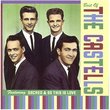| All Artists: Academy of Early Music Berlin Title: Music At The Berlin Court [Musik am Berliner Hof] Members Wishing: 0 Total Copies: 0 Label: Berlin Classics Release Date: 8/23/1994 Genre: Classical Styles: Forms & Genres, Concertos, Theatrical, Incidental & Program Music, Historical Periods, Baroque (c.1600-1750), Classical (c.1770-1830), Symphonies Number of Discs: 1 SwapaCD Credits: 1 UPCs: 4013108102527, 782124102524, 401310810252 |
Search - Academy of Early Music Berlin :: Music At The Berlin Court [Musik am Berliner Hof]
![Music At The Berlin Court [Musik am Berliner Hof]](https://nationalbookswap.com/cd//l/15/6515/6056515.jpg) | Academy of Early Music Berlin Music At The Berlin Court [Musik am Berliner Hof] Genre: Classical
|
Larger Image |
CD DetailsSimilar CDs
|
CD ReviewsTop Marks! Leslie Richford | Selsingen, Lower Saxony | 05/12/2007 (5 out of 5 stars) ""Musik am Berliner Hof" (Music at the Berlin Court). World Première Recordings from Unpublished Manuscripts of the German National Library in Berlin.
1. Christoph Nichelmann (1717 - 1762): Overture (Suite) in B flat major for two oboes, strings and b.c. [1737]. 2. Johann Philipp Kirnberger (1721 - 1783): Sinfonia in D major for two horns, strings and b.c. [date unknown]. 3. Johann Joachim Quantz (1697 - 1773): Concerto in E minor for transverse flute, strings and b.c. "Pour Potsdam" [date unknown]. 4. Christoph Schaffrath (1709 - 1763): Overture and Allegro assai for strings and b.c. [date unknown]. 5. Carl Philipp Emanuel Bach (1714 - 1788): Concerto in F major for two harpsichords, two horns, strings and b.c., Wq. 46 [1740]. (This last piece is NOT a world première recording.) Performers: Ernst-Burghard Hilse, transverse flute; Christine Schornsheim and Raphael Alpermann, harpsichords; members of the Akademie für Alte Musik Berlin (Berlin Academy for Ancient Music). Recorded at the Church of the Good News in Karlshorst, a suburb of Berlin, in November 1991. Released in 1992 as Berlin Classics BC 1025-2. Total time: 71'56". The Berlin Academy of Ancient Music (not to be confused with its namesake in London) is one of Germany's most exciting period-instrument ensembles. It was formed in the early 1980's by members of East Berlin orchestras and was to become East Germany's first ensemble playing on historical instruments. Its first CDs were recorded by the East German state recording company and licensed to the West German label Capriccio, and when they appeared they were given rave reviews in that section of the music press that had time for 18th century sounds. After German re-unification in 1990, the ensemble signed a contract with Edel's Berlin Classics label, and its "Music at the Berlin Court" CD was the firstfruits of that association. The four pieces by Nichelmann, Kirnberger, Quantz and Schaffrath are all world première recordings, the ensemble having dug the manuscripts out of the German National Library in Berlin. Interestingly enough, although all the compositions here are late baroque or early rococo (covering a period from about 1735 to 1760), each composer appears to have a very individual musical language. Nichelmann's Overture (suite) is very much in the style of Bach and Telemann - hardly surprising, since Bach and Telemann were his main teachers. The piece recorded here was written before Nichelmann joined Carl Philipp Emanuel Bach at the Court of the King of Prussia in Potsdam, and it sounds just like what one has come to associate with the music played by Bach and his Collegium at Zimmermann's café in Leipzig. Kirnberger was another pupil of Johann Sebastian Bach and later became harpsichordist, violinist and "kapellmeister" in the service of various Prussian royals. He became more famous for his theoretical works than for his compositions, being a great defender of counterpoint, but the Sinfonia played here is a delightful combination of the stricter older style with newer, freer elements pointing towards the "galant style" practised some years later by Johann Christian Bach in London. Quantz should be known to lovers of baroque music. He was the King of Prussia's flute teacher, and it was his music above all that was played at the court during the years around the middle of the 18th century. The flute concerto recorded here would have been performed presumably with either Quantz himself or with King Friedrich playing the solo part. Schaffrath was a harpsichordist and played chiefly for Princess Amalie after leaving Dresden where he was trained, possibly because he was unable to compete with the ability of Carl Philipp Emanuel Bach at the King's Court. His Overture and Allegro, while not perhaps being a major work, is a delightful example of the kind of music that would have been regularly heard at this period. The last item on the disc, Carl Philipp Emanuel Bach's concerto for two harpsichords, has been recorded before, and not surprisingly: It demonstrates beautifully both Carl Philipp's dependence on his father and his struggle to achieve his own expressive style. The concerto is played by the soloists and the Academy with a good deal of drive and relatively rapid tempi, making this quite an exciting piece of listening. As a fan of baroque music, I have made a point of collecting as many of the recordings of the Akademie für Alte Musik Berlin as possible. This one, too, is worthy of any collection, the engineering being faultless and the playing absolutely riveting. Top marks!" |

 Track Listings (15) - Disc #1
Track Listings (15) - Disc #1
